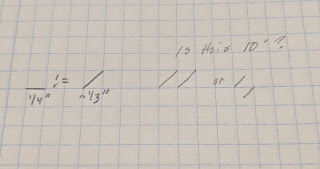I think I’ve mentioned this before, but it is hard to draw on the diagonal!
Using the 1st edition DMG Appendix A: Random Dungeon Generation, there are a number of ways that you’ll be set on a diagonal path:
- 45% chance on a side passage result
- 10% chance if you’re checking “what’s behind the door”
- On passage turns, there’s a 20% chance
A lot of opportunities to make drawing the map challenging!
It’s challenging for me because the distance between the X to X points, or Y to Y points isn’t the same as diagonal X to X. Obviously, thank you Pythagoras!
Now I could ignore that fact and just draw on the diagonal the full distance, but then what does a 10′ section look like? See below:
The left option means that anything “ahead” will end up shifting everything back to X/Y axis-aligned… and that just seems artificial?
So I’ve settled, for now, on using the right hand approach – a full diagonal stroke between the grid is ~ 20′. It’s not perfect, but I find that things line up a bit better. To be sure, my diagonal passages and rooms look slightly smaller than my X/Y axis aligned rooms and passages. But things just look better having settled on this approach for the moment.
I’ve even toyed with getting some plastic-card, sizing areas for typical grid-accurate room dimensions and a true 10 wide passage as a stencil. I might still, but for now, my hand-drawn approach is what I’m doing.
I can see why there were very few maps in the TSR modules that had large portions of the map on the diagonal. If they did, they were usually caves tunnels and non-finished passages.
To be sure, there’s the Demonweb from Q1, and a few of the Giant dungeons (G1, G3) had diagonal passages in “finished” portions, but none of them have whole sections of the dungeon with rooms/passages all at the diagonal.
I’m sure that my players are NOT going to like mapping to the diagonal. It’ll be interesting to see how they deal with what already imprecise measurements from me during play.
To explain that – unless the players are taking the time to pace out and measure things, I give them approximate measurements, based on paces. 2 paces is ~ 10 feet, so if it’s a 20×20 room, I’ll say “it’s square, probably 4 to 5 paces long and wide.” or “3 to 4 paces long and wide”.
They also don’t get cardinal directions until they purchase a compass, which is available in my worlds. Everything is “left, right, forward, behind”.
My Dungeon23 continues, steadily!
I finished the sublevel that is an homage to the Blackmoor supplement to OD&D.
For level 4, I’ve only got 3 “day areas” left to fill in for the month pages that I’m using. Then we proceed to keying! I’m going to see what the random monsters tell me that this level is about…
… although after initially writing this, one of my favorite metal songs popped up on my evening’s playlist and gave me some inspiration, so we might see where that goes as well!
Dungeon23 stats:
- Levels: 6
- Rooms: 271 (40 added in wk 10)
- Levels 1, 2, 3: mapped/keyed.
- Level 4 in progress.
- Level 5 started.
- Level 6 connected.
- 3 sublevels mapped/keyed.
- Town: Created, 7 locations/NPCs keyed.


Only because I end up doing math like this frequently (in video game design), I'd recommend using ~15' instead of ~20' for the diagonals on your grid. If your "1×1 unit" grid square is 10' x 10', then (as you mentioned: thanks, Pythagoras!) the diagonal would be "√2 units" or about "1.414 units" which converts to just a little more than 14'. Rounding it to a nice round 15' seems fair for modern day humans who are used to things coming in even 5s and 10s. The proportions between diagonal sections and orthogonal sections of your map will be awfully close to correct (at least on a small scale), and the numbers won't get too weird or far off from the "reality" of the dungeon dimensions.
I've been trying the 15', but the problem is then dividing up the small cross section into thirds for 5' and 10' sections where appropriate. I should note that my Hobonichi Techo notebook, the squares are very tiny, maybe 1/8" x 1/8". What you propose would probably be easier if the grid size was a bit more forgiving.
Still, I'm trying and we'll see how it turns out.